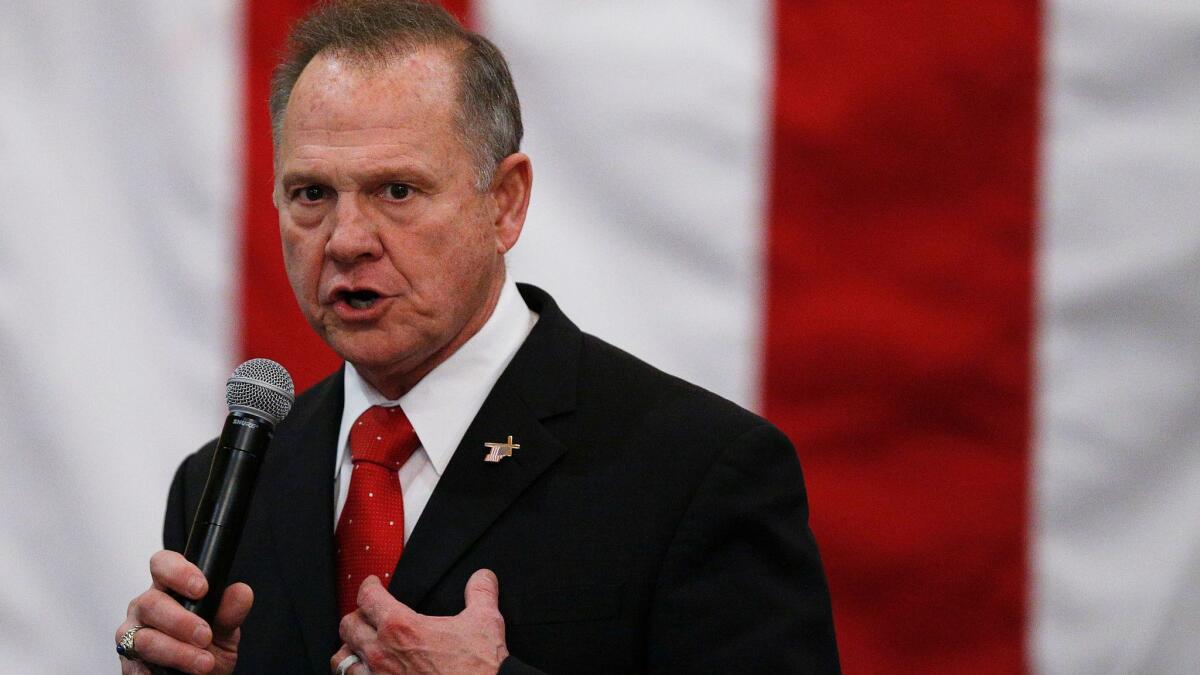Commentary: We may not agree on polarizing issues but we may end up respecting each other

- Share via
Americans treasure the “wall of separation,” as Thomas Jefferson put it, between religion and state. It has enabled the nation’s great variety of faiths — with few exceptions — to thrive free of government interference.
Yet it’s also important to recognize how much religion impacts public life in ways that please some and frustrate others, and 2017 was no exception.
Judge Roy Moore, twice-removed chief justice of the Alabama Supreme Court, was almost elected to the Senate because of his conservative religious values, especially his anti-abortion stance. For the past 40-plus years, the stance of politicians on the pro-life vs. pro-choice debate has been a crucial determinant of people’s voting choices. Without the powerful influence of Roman Catholics and Evangelical Christians, the morality of abortion would have gone largely unchallenged.
The rights of LGBT Americans have also been profoundly affected by the religious convictions of conservative people of faith. Last fall, the Supreme Court heard the case of Masterpiece Cake Shop v. Colorado Civil Rights Commission about whether the bakery could refuse to do a cake for a same-sex couple. It is a complex case that involves both religious rights and freedom of expression, but its outcome could have huge implications for gay rights and the values of conservative Christians and Orthodox Jews. The high court’s ruling is expected in June.
The rights of clergy to endorse political candidates from the pulpit or bema also arose in 2017 when some evangelical leaders attempted to revoke the so-called Johnson Amendment. Since 1954, the rule has forbidden preachers from making such endorsements, though they could speak out on various ethical issues such as climate change, evolution and, of course, abortion and gay rights. Abolition of the rule had been tacked onto the massive tax overhaul, but in the end the objections of liberal clergy and others got it expunged from the tax bill.
Finally, the evolution vs. intelligent design debate remained alive at the Texas Board of Education that ultimately voted in April to remove the word “evaluate” from the high-school science standards as it relates to teaching evolution. Though the courts have ruled that intelligent design or creationism may not be taught in science classes, biologists in Texas and elsewhere worried that “evaluate” might open the door to classroom debates on whether intelligent design was legitimate science.
The reflexive reaction to these religion-state controversies is that the other side represents either fanatical fundamentalism or godless secularism. In fact, however, though there are extremists on both sides, these ethical debates force us to think empathetically about why people can see these matters so differently. We probably will not change our stances, but we might end up respecting our religious and political others and gaining a more nuanced understanding of the really complex issues they raise, especially perhaps regarding abortion.
Costa Mesa resident BENJAMIN J. HUBBARD is a professor emeritus of religious studies at Cal State Fullerton.
All the latest on Orange County from Orange County.
Get our free TimesOC newsletter.
You may occasionally receive promotional content from the Daily Pilot.



